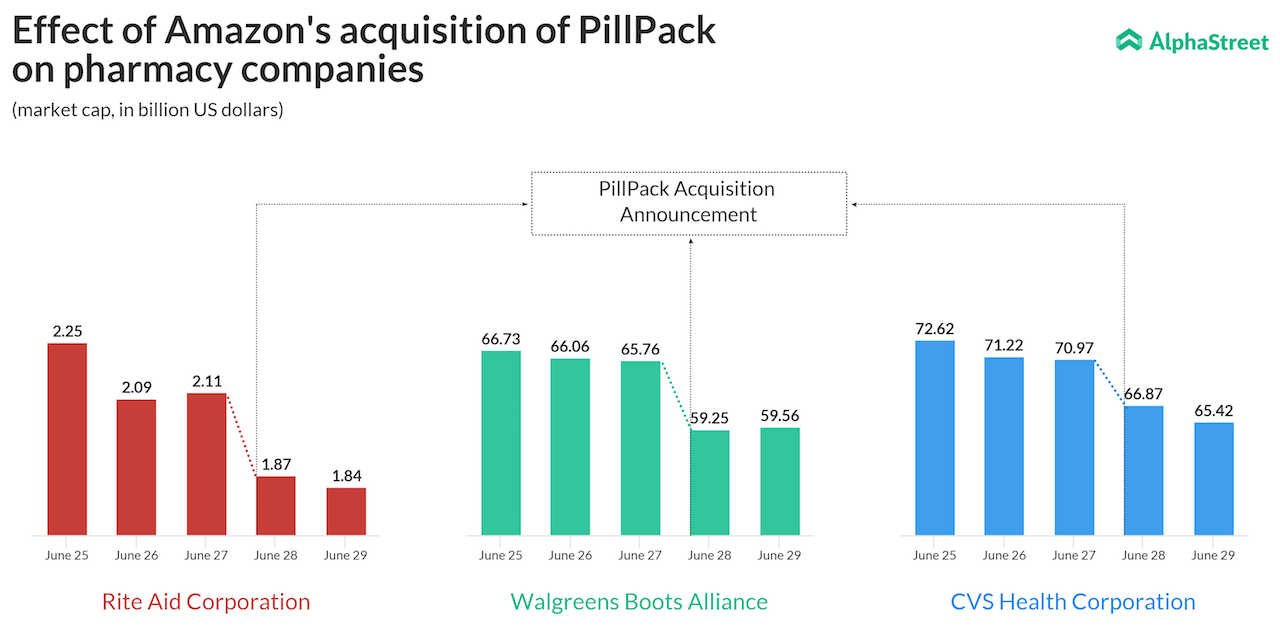Amazon’s acquisition of PillPack is coming at an interesting time. Last month, Berkshire Hathaway (BRK.A), Amazon (AMZN) and JPMorgan (JPM) have appointed Atul Gawande as CEO for their unnamed healthcare venture. The triumvirate also added that the new venture will be an independent one and would not focus on making profits. It’s still not clear how Bezos would connect the dots with the PillPack deal within a month of Gawande’s appointment.
Related: Atul Gawande will be the first CEO of Amazon/Berkshire/JPMorgan healthcare venture
PillPack deal gives Bezos to tap into the $400 billion/year US pharma market. With more than 50,000 customers, PillPack earned more than $100 million last year. Amazon seems to have clinched the deal from Walmart (WMT), as the latter was in talks for a possible buyout. PillPack has a license to ship prescriptions to 49 states in the US, which augurs well for Amazon and helps to expand its footprint across the country at one stroke.
Currently, about 90% of medicines in the US are filed at the drug store, which provides ample opportunity for Amazon to disrupt the traditional distribution model. The e-commerce giant is good at understanding the user behavior and coming up with suggestions for products, which has borne fruit over the years. It has been refining the technology continuously and is good at upselling and cross-selling products based on the shopping habits of users.
Related: Amazon swallows online pharmacy PillPack
When it comes to PillPack, even though it would give the e-commerce giant access to prescription data, the pharma industry is highly-regulated and it doesn’t allow firms to monetize the data or cross-sell products based on the prescriptions. However, if the user gives the consent to share the data, then firms can share or use that data as per the current regulations. Amazon has reiterated that it would comply with all regulations.
We need to wait and see whether it’s keeping PillPack data in silos or integrating it with the existing set-up, which forces it to comply with federal regulations for the entire organization. There are increasing concerns raised in the US and other parts of the globe about how tech companies are handling and using sensitive user data post the Facebook (FB) data scandal.
European Union recently rolled out the General Data Protection Regulation (GDPR), which clearly lays out rules about how firms can use the personal data. Along the same lines, the state of California also rolled out the privacy law, which gives users more control about how their sensitive data can be used by companies. It would be interesting to see how companies like Amazon and other tech giants are going to respond to these regulations.
Related: Amazon finds the healthcare space a hard nut to crack
Last year, Commonwealth Fund, which works on improving the healthcare access and coverage, stated that the US occupies the last position amongst high-income countries when it comes to healthcare system performance despite spending the most per head compared to other countries. It’s worth noting annual healthcare spending in the US last year stood at a whopping $3.5 trillion, which is projected to increase annually by 5.5% touching $5.7 trillion in 2026.
There is tremendous pressure amidst the existing players in the healthcare value chain, be it insurers, pharmacy benefit managers (PBM), drug stores and pharma companies, to reduce the spiraling costs and improve healthcare access for people across the country. Hence, there is a wave of consolidation happening in the industry.
Recently, health insurer Cigna (CI) bought Express Scripts (ESRX) for $54 billion, which is currently under judicial review. CVS is in talks to acquire Aetna (AET) for $69 billion and Rite Aid is mulling for the merger with Albertsons. Meanwhile, Walgreens has forged a partnership with players like UnitedHealth Group (UNH), Humana (HUM) and LabCorp to expand its footprint.
Bezos so far is currently tight-lipped about how PillPack deal is going to fit in the larger scheme of things. There are multiple options available currently to explore. He can either partner with existing PBMs, or move towards a hybrid model by providing physical/online presence with the help of the PillPack and Whole Foods deals or avoid the middlemen to provide services directly to clients which can be juxtaposed with the recent healthcare venture with Berkshire and JPMorgan.
Amazon’s traditional way of running its business with low margins is going to make life tougher for its peers in the healthcare domain. With multiple options in its arsenal, whichever route Bezos takes, this space is going to see some action in the impending future and you should not be surprised when you get an option to order your pills through Alexa.

